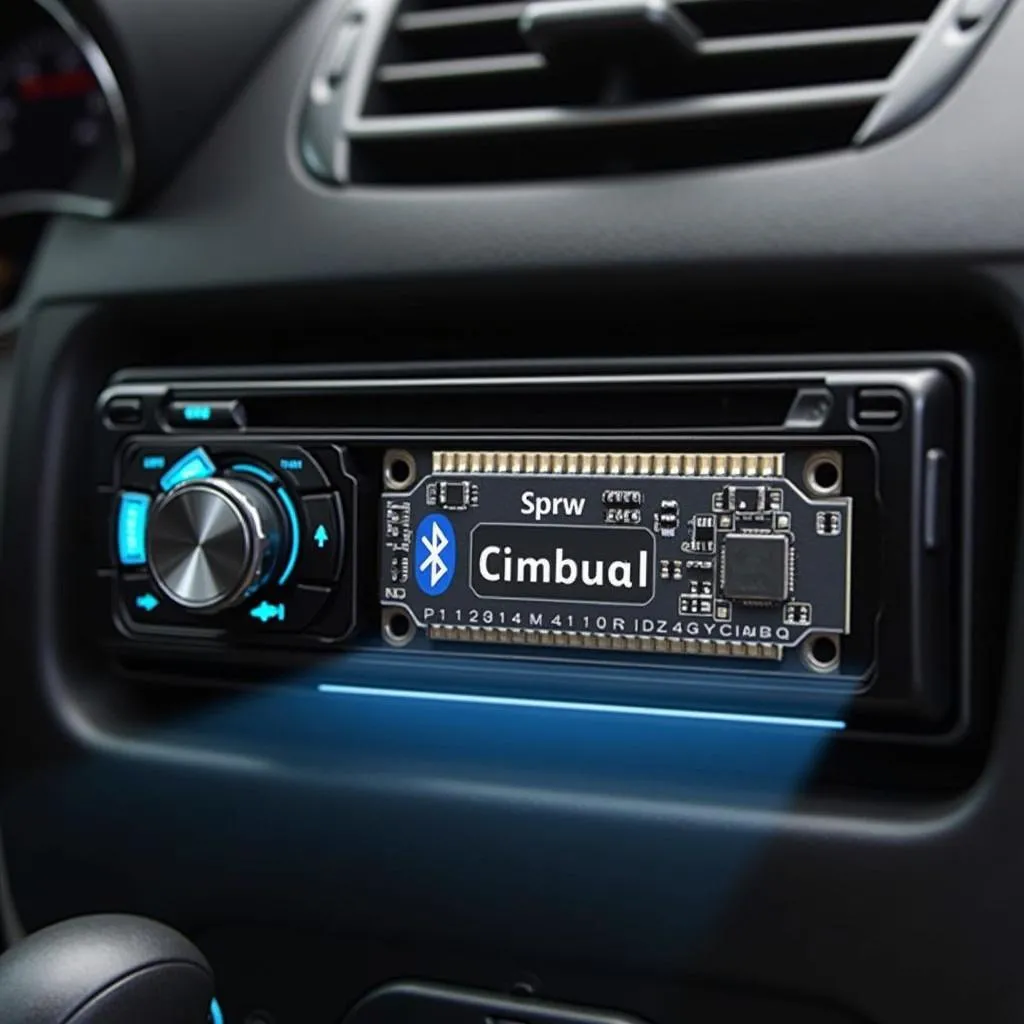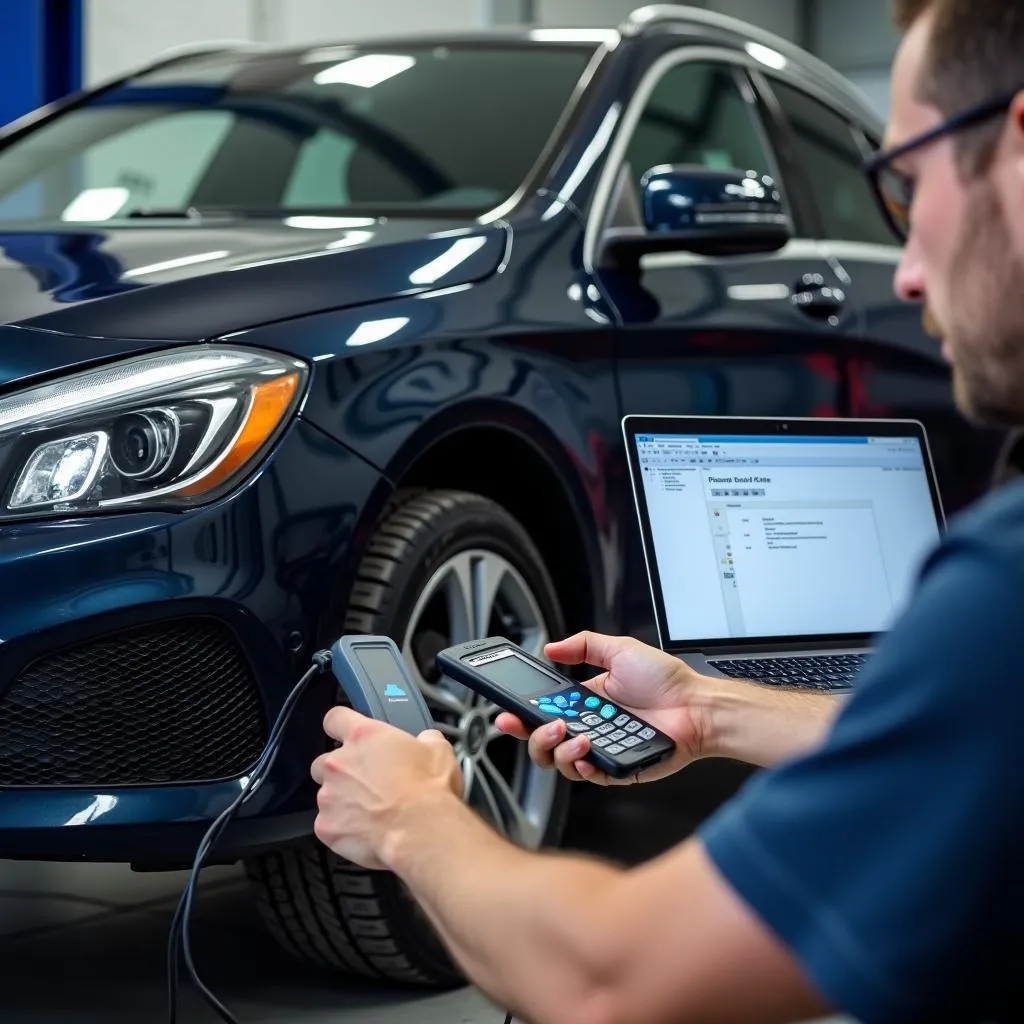If you’re a Volkswagen Touareg owner, you might have encountered the dreaded “new brake pad wear sensor warning” message flashing on your dashboard. This alert, often accompanied by a persistent beeping sound, can be perplexing, especially if you’ve recently replaced your brake pads. Don’t worry, this is a common issue with a straightforward solution in many cases. This article will guide you through understanding the warning, its possible causes, and how to address them. We’ll also delve into some advanced troubleshooting steps and when to seek professional help.
Understanding the Brake Pad Wear Sensor
Your Volkswagen Touareg is equipped with a sophisticated electronic system designed to monitor the health of your brakes. A key component of this system is the brake pad wear sensor, a tiny device embedded within the brake pad itself. This sensor acts as a vigilant guardian, constantly measuring the thickness of your brake pads. When the pads wear down to a critical level, typically signaling the need for replacement, the sensor triggers the warning message on your dashboard. This system helps ensure optimal braking performance and your safety on the road.
Common Causes of a False Warning
While a genuine worn-down brake pad is a likely culprit for triggering the warning, several other factors can contribute to a false alarm:
- Damaged Sensor Wire: The sensor connects to your vehicle’s electrical system via a thin wire, prone to damage from road debris, corrosion, or improper installation. A break in this wire can disrupt the signal, leading to a false warning.
- Faulty Sensor: Like any electronic component, the sensor itself can malfunction. Over time, exposure to heat, moisture, and vibrations can cause the sensor to fail, triggering the warning even with new brake pads.
- Incorrect Pad Installation: If your new brake pads were not installed correctly, particularly if the sensor was not properly seated or connected, the system might misinterpret the signal and trigger the warning.
Troubleshooting the Warning
Before you rush to a mechanic, there are a few troubleshooting steps you can perform to identify the root cause of the warning:
- Inspect the Sensor Wire: Carefully examine the wire connecting the brake pad sensor to the vehicle’s wiring harness. Look for any signs of damage, such as cuts, frays, or loose connections. If you discover damage, a simple fix might involve repairing or replacing the wire.
- Check the Sensor Connection: Ensure the sensor is correctly seated in its designated slot within the brake pad. If it seems loose or misaligned, gently push it back into place until you hear a click, confirming its secure connection.
- Examine the Brake Pad Thickness: Although you mentioned installing new brake pads, it’s wise to visually inspect them. Ensure they are indeed new and not excessively worn down. Sometimes, even new brake pads can be defective.
Advanced Troubleshooting & When to Seek Professional Help
If the basic troubleshooting steps fail to resolve the issue, it’s time for more advanced diagnostics. These often require specialized tools and expertise best left to professionals:
- Scanning for Diagnostic Trouble Codes (DTCs): A professional mechanic can connect your Volkswagen Touareg to a diagnostic scanner, which reads codes stored in the vehicle’s computer. These codes provide specific insights into the nature of the warning, pinpointing the faulty sensor or other potential issues.
- Testing Sensor Circuitry: Using a multimeter, a mechanic can test the continuity and resistance of the sensor circuit. This helps determine if the sensor is receiving power and sending the correct signals.
Expert Insight from David Miller, ASE Certified Master Technician: “While attempting basic checks is fine, it’s crucial to remember that brake systems are safety-critical. If you’re unsure about any step or if the issue persists, always consult a qualified mechanic.”
Preventing Future Issues
Prevention is always better than cure. Here are some tips to minimize the chances of encountering the brake pad wear sensor warning in the future:
- Regular Brake Inspections: Make it a habit to visually inspect your brake pads every time you change your oil or at least every six months. Look for signs of wear, such as thin pads or uneven wear patterns.
- Timely Brake Pad Replacement: Adhere to the manufacturer’s recommended brake pad replacement intervals. Timely replacement not only prevents sensor issues but, more importantly, ensures optimal braking performance and safety.
Conclusion
Encountering the “new brake pad wear sensor warning” on your Volkswagen Touareg can be frustrating, but understanding its potential causes and solutions can help you address the issue effectively. While some causes are simple enough to troubleshoot and fix yourself, others require the expertise of a professional mechanic. Remember, a well-maintained brake system is paramount to your safety and the longevity of your vehicle. So, pay attention to those warning lights and take prompt action to keep your Volkswagen Touareg running smoothly and safely for miles to come.


